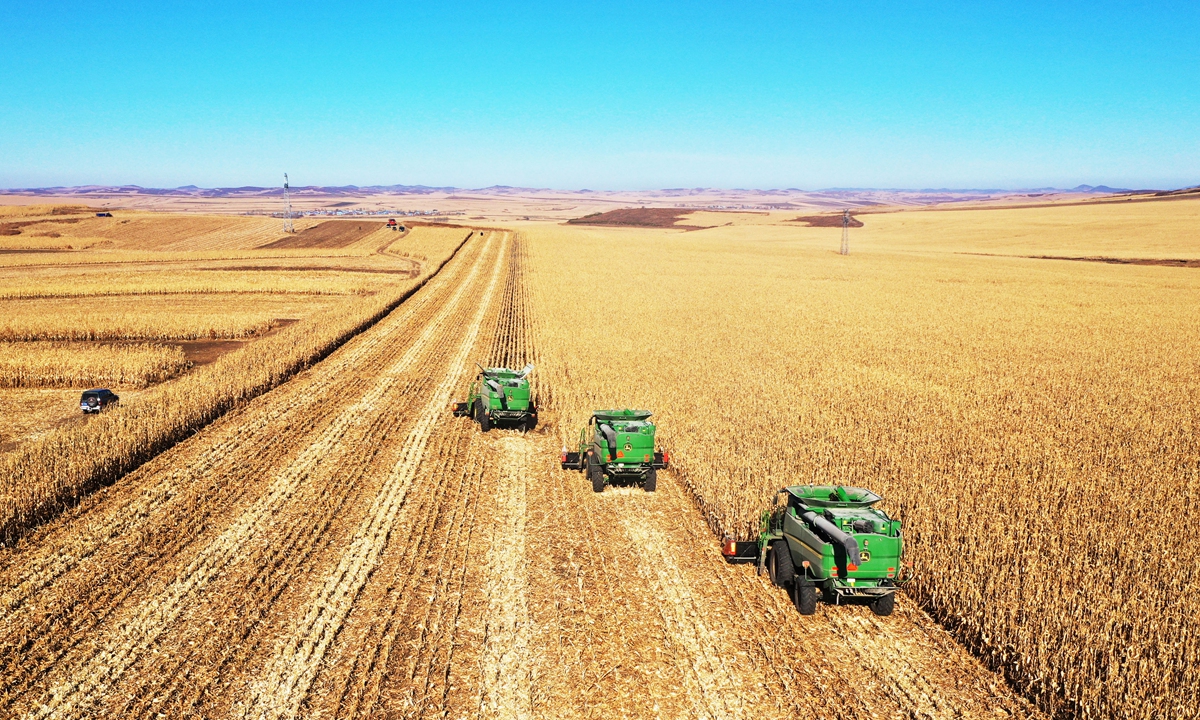Ukraine tensions to affect agricultural trade, but impact on China limited: analysts
Prices of agricultural products likely to surge; impact on China limited: analysts

Large machines harvest corn in Hulun Buir City, North China's Inner Mongolia Auton?omous Region, on November 3, 2021 during the autumn harvest. As of October 28, more than 80 percent of the autumn grain had been harvested, ensuring a bumper year. Photo: cnsphoto
Click here to stay tuned with our live updates on Ukraine tensions.
The escalating situation in Ukraine will likely push global corn and wheat prices higher and affect China's agricultural imports from the country, which supplies around 30 percent of China's corn imports, though the impact will be limited, industry analysts said on Thursday.
In addition, certain trade between China and Ukraine may also be affected, with some companies making light industrial goods trade in China saying that they have already seen significant drop in export orders to Ukraine and traders are concerned over logistics and other issues, according to industry sources.
In terms of overall trade, China in 2019 surpassed Russia to become Ukraine's biggest trading partner and reported bilateral trade value at around $19.3 billion in 2021, Chinese customs data showed. Major Ukrainian exports to China are iron ore and agricultural products, while China exports electrical machinery and consumer goods to Ukraine.
As a big producer of corn, Ukraine supplied 23.86 million tons of corn to the world in 2020-2021, accounting for 13.3 percent of global corn export volume, statistics provided by Mysteel consultancy to the Global Times showed. The country is also a major supplier of wheat, accounting for about 12 percent of global wheat exports.
"If corn exports by Ukraine are suspended, global corn prices will be further pushed up," Liu Dong, a senior analyst specializing in corn at the Mysteel consultancy, told the Global Times on Thursday.
US corn futures climbed to an eight-month peak, while wheat futures reached their highest in more than nine years, and both crops' futures rose by their daily trading limits on Thursday, according to Reuters. Benchmark corn futures traded in Chicago have surged around 16 percent this year on Wednesday.
Amid soaring prices in the global market, Chinese corn prices also skyrocketed 36.84 percent to 2,600 yuan ($411.29) per ton, China Media Group reported.
In addition to being a "breadbasket of Europe," Ukraine was also China's largest corn supplier from 2015 to 2020, after corn trade between the two countries started in 2013, according to Liu. The portion of Ukrainian corn in China's total imports remained above 60 percent during that period, Liu noted.
But after China increased corn imports from the US starting from 2020, China's corn imports from Ukraine accounted for only 29.07 percent out of all Chinese corn imports. Still, the import volume kept rising and reached a record high in 2021 at 8.24 million tons, Chinese customs data showed.
China has imported a large amount of corn, wheat and barley for feed processing as domestic corn prices have surged. Corn from Ukraine usually sets out from the port of its capital Kiev and heads to China's eastern and southern ports via sea.
In addition to the US and Ukraine, China also purchases corn from Russia, Myanmar and Laos, but in limited volumes.
"As corn supplies from Ukraine only accounted for 2.55 percent of China's total corn consumption, the tensions in Ukraine will only have a limited impact on China's corn imports. Moreover, China could hike imports from [other sources] to meet domestic demand," Liu said.
Under a bilateral agreement signed by Russian agricultural and Chinese customs authorities earlier in February, wheat from all of Russia's producing regions will be cleared for export to China, provided it meets certain requirements, China's customs authority announced in a statement on Thursday.
In addition to corn and wheat, which may suffer the first wave of shock, barley is another agricultural product facing uncertainties. In 2020-2021, 54 percent of Ukrainian barley went to China, accounting for 28 percent of China's barley imports, Chinese industry website feed trade.com said.
However, even if the Ukraine situation has no impact on Chinese agricultural imports, incentives for local producers to rush to place orders for Ukrainian corn at such a time are low, analysts said.
"The global corn price is skyrocketing, which makes it lose its price edge over homegrown corn. So Chinese buyers will turn to domestic corn, or seek import alternatives such as sorghum and barley," Jiao Shanwei, editor-in-chief of industry news website cngrain.com, told the Global Times.
He noted that the impact on China's grain security is "controllable" as China has achieved self-sufficiency in corn.
A trader based in East China's Zhejiang Province said that orders of light industrial goods heading to Ukraine have dived 30-40 percent year-on-year.
"The Russia-Ukraine [situation] may halt the full-year trade of light industrial products in the province. All aspects will be disrupted, such as traffic suspension," Zhu Qiucheng, CEO of Ningbo New Oriental Electric Industrial Development, told the Global Times on Thursday, noting that some traders are also worried about potential payment problems.


